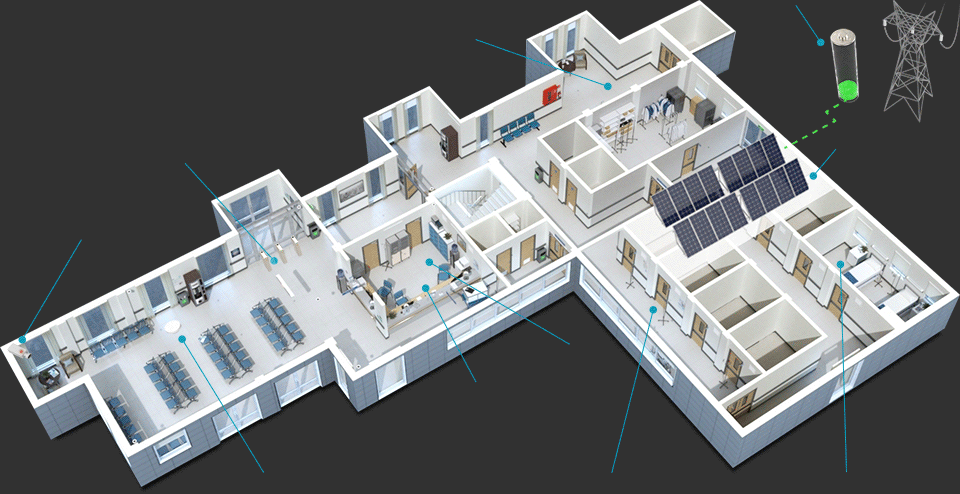Intelligent Building Automation Technologies Market Expected to Reach $232.32 Billion by 2032, Growing at a CAGR of 11.2%
- prajwal79
- May 20, 2025
- 3 min read

The global intelligent building automation technologies market is experiencing rapid expansion, with a valuation of USD 90.47 billion in 2023 and expected growth to USD 232.32 billion by 2032, reflecting a healthy compound annual growth rate (CAGR) of 11.2% over the forecast period.
The increasing adoption of smart building systems powered by the Internet of Things (IoT), artificial intelligence (AI), and advanced sensors is revolutionizing building management worldwide. These technologies enable efficient energy management solutions, improved occupant comfort, enhanced security, and operational cost savings, driving the demand for intelligent building automation.
Market Overview
Intelligent building automation integrates hardware, software, and communication technologies to monitor and control building functions such as heating, ventilation, air conditioning (HVAC), lighting, security, and access control.
Key growth drivers include:
Growing emphasis on energy conservation and sustainability standards
Rising construction of commercial and residential smart buildings
Government initiatives and regulations promoting green buildings
Advancements in IoT-enabled automation and AI-driven analytics
Increasing need for safety, security, and optimized facility management
The market is witnessing significant investments in technologies like smart sensors, building management systems (BMS), and integrated software platforms that facilitate real-time monitoring and predictive maintenance.
𝐄𝐱𝐩𝐥𝐨𝐫𝐞 𝐓𝐡𝐞 𝐂𝐨𝐦𝐩𝐥𝐞𝐭𝐞 𝐂𝐨𝐦𝐩𝐫𝐞𝐡𝐞𝐧𝐬𝐢𝐯𝐞 𝐑𝐞𝐩𝐨𝐫𝐭 𝐇𝐞𝐫𝐞:
Market Segmentation
The intelligent building automation technologies market is segmented by component, application, and region.
By Component:
Hardware
Sensors and Detectors
Controllers and Gateways
Networking Equipment
Software and Services
Building Management Systems (BMS)
Energy Management Software
Security and Access Control Software
Maintenance and Support Services
Hardware remains a substantial market share holder, while software and services are growing rapidly due to increasing integration complexity and demand for analytics.
By Application:
Commercial Buildings
Residential Buildings
Industrial Facilities
Healthcare Facilities
Educational Institutions
Others (Retail, Hospitality)
Commercial buildings lead the adoption of intelligent automation technologies owing to the potential for significant energy savings and operational efficiencies. Residential smart homes are also gaining traction as consumer awareness rises.
Regional Analysis
North America: Market Leader with High Adoption Rates
North America dominates due to the presence of major technology vendors, widespread adoption of smart building technologies, and supportive regulatory frameworks promoting energy efficiency.
Europe: Strong Growth Fueled by Sustainability Initiatives
Europe shows considerable growth with countries like Germany, the UK, and France focusing on reducing carbon footprints through advanced building automation and smart energy management.
Asia-Pacific: Fastest Growing Market
Asia-Pacific is expected to register the highest CAGR, driven by rapid urbanization, booming commercial infrastructure, and rising government investments in smart city projects across China, India, Japan, and South Korea.
Latin America, Middle East & Africa: Emerging Markets
These regions are witnessing gradual adoption supported by increasing infrastructure development and modernization of existing facilities.
Key Companies and Competitive Landscape
Key players in the intelligent building automation technologies market focus on innovation, partnerships, and acquisitions to expand their product portfolios.
Leading companies include:
ABB Ltd.
Azbil Corporation
Carrier Global Corporation
Delta Controls
Eaton Corporation
Emerson Electric co.
General Electric
Honeywell International
Ingersoll Rand, Inc.
Johnson Controls, Inc.
Rockwell Automation, Inc.
Schneider Electric SE
Siemens Building Technologies Inc.
Innovation and Future Trends
Integration of AI and machine learning for predictive maintenance and automated decision-making.
Expansion of IoT-enabled sensors and connected devices for granular control.
Development of cloud-based platforms facilitating remote monitoring and data analytics.
Emphasis on cybersecurity to protect building automation systems.
Growth of smart grids and renewable energy integration in building management.
Conclusion
The intelligent building automation technologies market is on a strong growth trajectory, driven by increasing demand for energy management solutions, enhanced occupant experience, and sustainability goals. The convergence of IoT, AI, and cloud computing will continue to transform how buildings are managed and operated through 2032.
𝐁𝐫𝐨𝐰𝐬𝐞 𝐌𝐨𝐫𝐞 𝐑𝐞𝐬𝐞𝐚𝐫𝐜𝐡 𝐑𝐞𝐩𝐨𝐫𝐭𝐬:


Comments